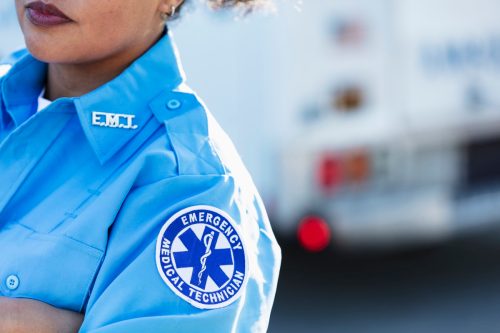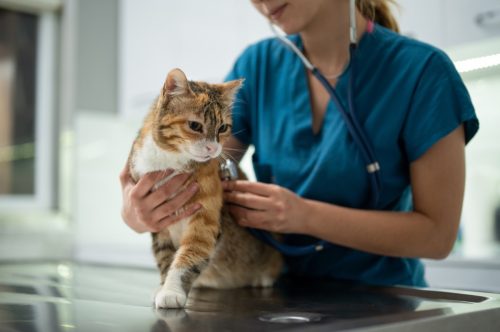4 Major Staffing Shortages That Could Cause Big Problems for You

While it’s been a few years since we were fighting over toilet paper in store aisles at the start of the COVID pandemic, that doesn’t mean supply issues aren’t still affecting us. These days, grocery staples such as eggs and popular prescriptions like Adderall are among the things we’re finding it hard to get our hands on. But it’s not just about the products we can’t seem to locate. The U.S. is also facing a major labor shortage, with a number of industries struggling to retain workers and keep important roles filled. Read on to learn more about the staffing shortages that could cause problems for you.
READ THIS NEXT: It’s Not Just Adderall—These Medications Are Also Facing Shortages Now.
1
Pharmacists

It’s not just the medications you need that are in short supply these days—it’s also the people filling those prescriptions.
According to a Jan. 2023 report from the National Community Pharmacists Association (NCPA), two-thirds of pharmacy owners are struggling to fill open staffing positions right now. And at nationwide drugstores, this pharmacist shortage is already affecting customers. In Dec. 2022, both Walgreens and Rite Aid told USA Today that they had begun to adjust pharmacy hours as a result of staffing issues.
Last month, CVS announced that it would cut pharmacy hours this spring amid the pharmacist shortage. Amy Thibault, CVS Pharmacy’s lead director of external communications, told USA Today that roughly two-thirds of the company’s retail pharmacies will reduce hours starting in March. Reduced hours will occur during times when there is low patient demand or when stores have only one pharmacist at the pharmacy.
But Thibault told USA Today that CVS will periodically review operating hours to ensure stores are open during high-demand times. “By adjusting hours in select stores this spring, we ensure our pharmacy teams are available to serve patients when they’re most needed,” she said.
2
USPS workers

Communities around the U.S. have been facing frustrating postal problems for quite some time now.
In Maine, mail delivery delays have “been going on for months,” North Yarmouth resident Jim Smith told local CBS-affiliate WGME last month. The story is the same over in Colorado, as West Aurora resident Kenneth Hanson recently told local NBC-affiliate 9News that “for the last couple of months” mail delivery in the area has been “sporadic.”
“It’s no secret that the Postal Service is facing current staffing and hiring challenges encountered by nearly every industry,” Kim Frum, a USPS spokeswoman, told EastIdahoNews.com. “When a customer doesn’t get daily mail service, we understand their frustration because in addition to being Postal employees, we are also Postal customers.”
To address this challenge, the Postal Service has been hosting job fairs across the country, from California to New York. In a separate interview with NBC-affiliate King 5 in Seattle, Frum said that the USPS has “been aggressively hiring” nationwide and will continue to do so until it is fully staffed.
“We take pride in the more than 200 years of consistent service to the nation and the communities we serve. This is why we are hiring so many employees—because our customers rely on us and we need to get back to reliable, daily mail service,” Frum added in her statement to EastIdahoNews.com.
RELATED: For more up-to-date information, sign up for our daily newsletter.
3
EMTs

A shortage of EMTs is something of an emergency. According to a 2022 American Ambulance Association (AAA) study, the overall 2021 turnover rate for full-time and part-time EMTs was 36 percent, while it was 27 percent for full-time paramedics, and 30 percent for part-time paramedics.
As a result, 39 percent of part-time EMT and 55 percent of part-time paramedic positions went unfilled last year.
“It’s an absolute crisis. We have continual paramedics hitting the exit doors and leaving the field,” AAA President Shawn Baird told CBS News in Dec. 2022. “It can mean the difference of having an ambulance or not having an ambulance.”
Many EMTs and paramedics have left voluntarily, with Pew Charitable Trusts explaining that “low wages, a lack of work-life balance, and burnout” are among some of the major factors causing them to leave their positions.
“The public doesn’t see where there’s no one in the station, and volunteer services are trying to muster a crew,” Dia Gainor, executive director of the National Association of State EMS Officials and former director of the Idaho EMS office for 19 years, told Pew.
4
Veterinarians

Staffing struggles may not only affect the human members of your family, however. Animals are also suffering right now due to a lack of vets.
Mars Veterinary Health said the industry is currently “facing a chronic shortage of veterinary professionals,” with an estimated shortage of nearly 15,000 veterinarians expected to exist by 2030. One of the largest contributing factors? A rise in pet ownership amid the pandemic.
“The number of pets has increased so very much,” Dana Varble, DVM, chief veterinary officer, at North American Veterinary Community (NAVC), told CBS-affiliate WKMG in Orlando, Florida. “It’s not so much that we’re an unprepared industry. It’s that the number of pets and the pet owning population and the way we treat our pets has changed so much over the last 10 to 20 years.”
Pet owners are already feeling the shortage, with many having to wait weeks or even months to get a vet appointment. But that is just the tip of the iceberg. Denise Wilkinson, CEO of animal shelter Pawmetto Lifeline in Columbia, South Carolina, told local Fox-affiliate WACH that they have had to cancel some low-cost clinics because of the lack of vets.
“We could actually operate our wellness clinics six days a week but we can only operate it three days a week now,” Wilkinson said. “We worry that a lot of pets that go without care will end up being euthanized or end up going back home where they will get sicker and maybe have a very traumatic death.”